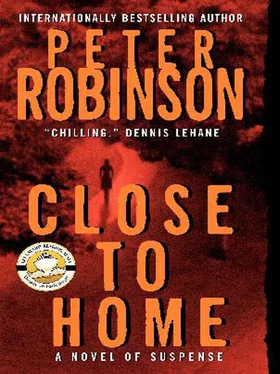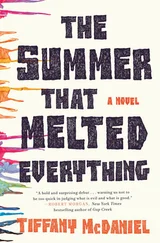
Peter Robinson
Close To Home (aka The Summer That Never Was)
Book 13 in the Inspector Banks series, 2003
The glory dropped from their youth and love,
And both perceived they had dreamed a dream;
Which hovered as dreams do, still above:
But who can take a dream for a truth?
– ROBERT BROWNING, “The Statue and the Bust”
Trevor Dickinson was hungover and bad-tempered when he turned up for work on Monday morning. His mouth tasted like the bottom of a birdcage, his head was throbbing like the speakers at a heavy metal concert, and his stomach was lurching like a car with a dirty carburetor. He had already drunk half a bottle of Milk of Magnesia and swallowed four extra-strength paracetamol, with no noticeable effect.
When he arrived at the site, Trevor found he had to wait until the police had cleared away the last of the demonstrators before he could start work. There were five left, all sitting cross-legged in the field. Environmentalists . One was a little gray-haired old lady. Ought to be ashamed of herself, Trevor thought, a woman of her age squatting down on the grass with a bunch of bloody Marxist homosexual tree-huggers.
He looked around for some clue as to why anyone would want to save those particular few acres. The fields belonged to a farmer who had recently been put out of business by a combination of mad-cow disease and foot-and-mouth. As far as Trevor knew, there weren’t any rare pink-nippled fart warblers that couldn’t nest anywhere else in the entire country; nor were there any ivy-leafed lark’s-turds lurking in the hedgerows. There weren’t even any trees, unless you counted the shabby row of poplars that grew between the fields and the A1, stunted and choked from years of exhaust fumes.
The police cleared away the demonstrators – including the old lady – by picking them up bodily and carting them off to a nearby van, then they gave the go-ahead to Trevor and his fellow workers. The weekend’s rain had muddied the ground, which made maneuvering more difficult than usual, but Trevor was a skilled operator, and he soon got his dipper shovel well below the topsoil, hoisting his loads high and dumping them into the waiting lorry. He handled the levers with an innate dexterity, directing the complex system of clutches, gears, shafts and winch drums like a conductor, scooping as much as the power shovel could hold, then straightening it so as not to spill any when he lifted it up and over to the lorry.
Trevor had been at work for well over two hours when he thought he saw something sticking out of the dirt.
Leaning forward from his seat and rubbing condensation from the inside window of the cab, he squinted to see what it was, and when he saw, it took his breath away. He was looking at a human skull, and what was worse was that it seemed to be looking right back at him.
Alan Banks didn’t feel in the least bit hungover, but he knew he’d drunk too much ouzo the night before when he saw that he had left the television on. The only channels it received were Greek, and he never watched it when he was sober.
Banks groaned, stretched and made some of the strong Greek coffee he had become so attached to during his first week on the island. While the coffee was brewing, he put on a CD of Mozart arias, picked up one of last week’s newspapers he hadn’t read yet, and walked out on the balcony. Though he had brought his Discman, he felt fortunate that the small time-share flat had a mini stereo system with a CD player. He had brought a stack of his favorite CDs with him, including Billie Holiday, John Coltrane, Schubert, Walton, The Grateful Dead and Led Zeppelin.
He stood by the iron railings listening to “Parto, ma tu, ben mio” and looking down at the sea beyond the jumbled terraces of rooftops and walls, a cubist composition of intersecting blue and white planes. The sun was shining in a perfect blue sky, the way it had done every day since he had arrived. He could smell wild lavender and rosemary in the air. A cruise ship had just dropped anchor, and the first launches of the day were carrying their loads of excited camera-bearing tourists to the harbor, gulls squawking in their wake.
Banks went to pour himself some coffee, then came out again and sat down. His white wooden chair scraped against the terra cotta tiles, scaring the small lizardlike creature that had been basking in the morning sun.
After looking at the old newspaper and perhaps reading a little more of Homer’s Odyssey, Banks thought he would walk down to the village for a long lunch, maybe have a glass or two of wine, pick up some fresh bread, olives and goat cheese, then come back for a nap and a little music before spending his evening at the taverna on the quayside playing chess with Alexandros, as had been his habit since his second day.
There was nothing much that interested him in the newspapers except the sports and arts pages. Rain had stopped play in the third test match at Old Trafford, which was hardly news; England had won an important World Cup qualifying match; and it wasn’t the right day of the week for the book or record reviews. He did, however, notice a brief report on a skeleton uncovered by a construction worker at the site of a new shopping center by the A1, not far from Peterborough. He only noticed it because he had spent a good part of his early life in Peterborough, and his parents still lived there.
He put the newspaper aside and watched the gulls swoop and circle. They looked as if they were drifting on waves of Mozart’s music. Drifting, just like him. He thought back to his second conversation with Alexandros. During their game of chess, Alex had paused, looked seriously at Banks and said, “You seem like a man with many secrets, Alan, a very sad man. What is it you are running from?”
Banks had thought about that a lot. Was he running? Yes, in a way. Running from a failed marriage and a botched romance, and from a job that had threatened, for the second time in his life, to send him over the edge with its conflicting demands, its proximity to violent death and all that was worst in people. He was seeking a temporary escape, at least.
Or did it go deeper than that? Was he trying to run away from himself, from what he was, or from what he had become? He had sat there pondering the question and answered only, “I wish I knew,” before making a rash move and putting his queen in jeopardy.
He had managed to avoid affairs of the heart during his brief stay. Andrea, the waitress at Philippe’s taverna, flirted with him, but that was all. Occasionally, one of the women from the cruise ships would give him that certain kind of wistful look which led only to one place if you let it, but he hadn’t let it. He had found himself a place where he didn’t have to confront crime on a daily basis, more particularly a place where he didn’t have to go down into cellars stuffed with the violated bodies of teenage girls, a scene from his last case that still, even here on this peaceful island, haunted his dreams.
So he had achieved his goal – run away from a messy life and found paradise of a kind. Why was it, then, that he still felt so damn restless?
Detective Inspector Michelle Hart of the Cambridgeshire Constabulary, Northern Division, entered the forensic anthropology department of the District Hospital. She was looking forward to this morning. Usually at postmortems she found herself disturbed not so much by the cutting and probing itself as by the contrast between the bright reflective surfaces of utilitarian tile and steel and the messy slosh of stomach contents, the dribbles of blackish blood running into the polished gutters, between the smell of disinfectant and the stench of a punctured bowel. But this morning, none of that was going to happen. This morning, all that Dr. Wendy Cooper, the forensic anthropologist, had to examine was bones.
Читать дальше













